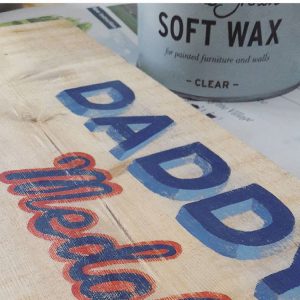Table of Contents
Furniture restoration includes far more than a replacement of hinges and a second coat of wood varnish; in fact there are several new considerations that one must make when restoring old furniture. One of the most important questions to ask is whether or not one will repaint the item and what type of paint will be used. In previous years individuals would repaint furniture using synthetic water-based paint; however, recent years have seen an introduction of something known as chalk paint. Its popularity has grown greatly over the past few years and people have begun using chalk paint for various purposes. This article will provide information on what chalk paint is and how one can chalk paint furniture.
Step #1: Choosing The Furniture Item
The first step to chalk painting furniture is to choose the furniture item to be painted. It is recommended that beginner’s choose small items for an initial project; this is to ensure the individual does not become overwhelmed by the task. Typical first project furniture items include small tables and bedside cabinets.
Step #2: Gathering The Resources
The next step is to gather the different items required to paint the furniture item. Materials should include at least one appropriately sized paint brush and two clean rags to clear any overflow. To actually paint the item, one will require at least one quart of chalk paint. The most popular type of chalk paint across the US, Canada, UK, Australia and New Zealand is that of Annie Sloan chalk paint. It is recommended that one purchase the appropriate amount of chalk paint from Annie Sloan retail stores, along with one tin of Annie Sloan clear soft wax and an Annie Sloan wax brush.
See Also : Working On Creating Chalk Paint Countertops
Step #3: Preparing The Workspace
Contrary to popular belief, it is not possible to chalk paint furniture in any area of the property; instead, it is best to prepare an effective work space. When creating the most beneficial work space one must consider various factors including the temperature of the area, ventilation, lighting, and floor protection.
Temperature is important as it will affect the drying time of the paint and the ease of application. Ventilation is vital, particularly when working in a small area, as this will ensure that no toxic fumes will gather in the area. Of course, chalk paint does not present with toxic fumes but it is still recommended that there be adequate ventilation.
Natural light is essential for a work space. By using natural lighting one will obtain a more ‘natural’ furniture painting effect. Finally, protecting the floor reduces the concern for any dripping paint. This can be completed using painter’s tape with builder’s paper.
Step #4: Preparing The Furniture
To ensure effective painting of the furniture item, it is essential that one remove any unwanted elements on the item; for example, one must remove any grime or dust. To ensure that the item does not present with rough edges, it is recommended that one run one’s hand across the surface. If there are any rough edges or sticking areas, it is necessary to sand the furniture.
Step #5: Applying The Chalk Paint
Before applying the chalk paint, it is necessary to mix the paint substance thoroughly thus ensuring an appropriate chalk paint consistency. Working slowly, section by section, one can applying the chalk paint carefully using the paint brush. The application is completed using the traditional painting method. It may be necessary to apply more than one coat.
Final Words On The Matter
As can be seen, there are various considerations to make when choosing to chalk paint furniture. Following the directions above will make this procedure less daunting or overwhelming.


